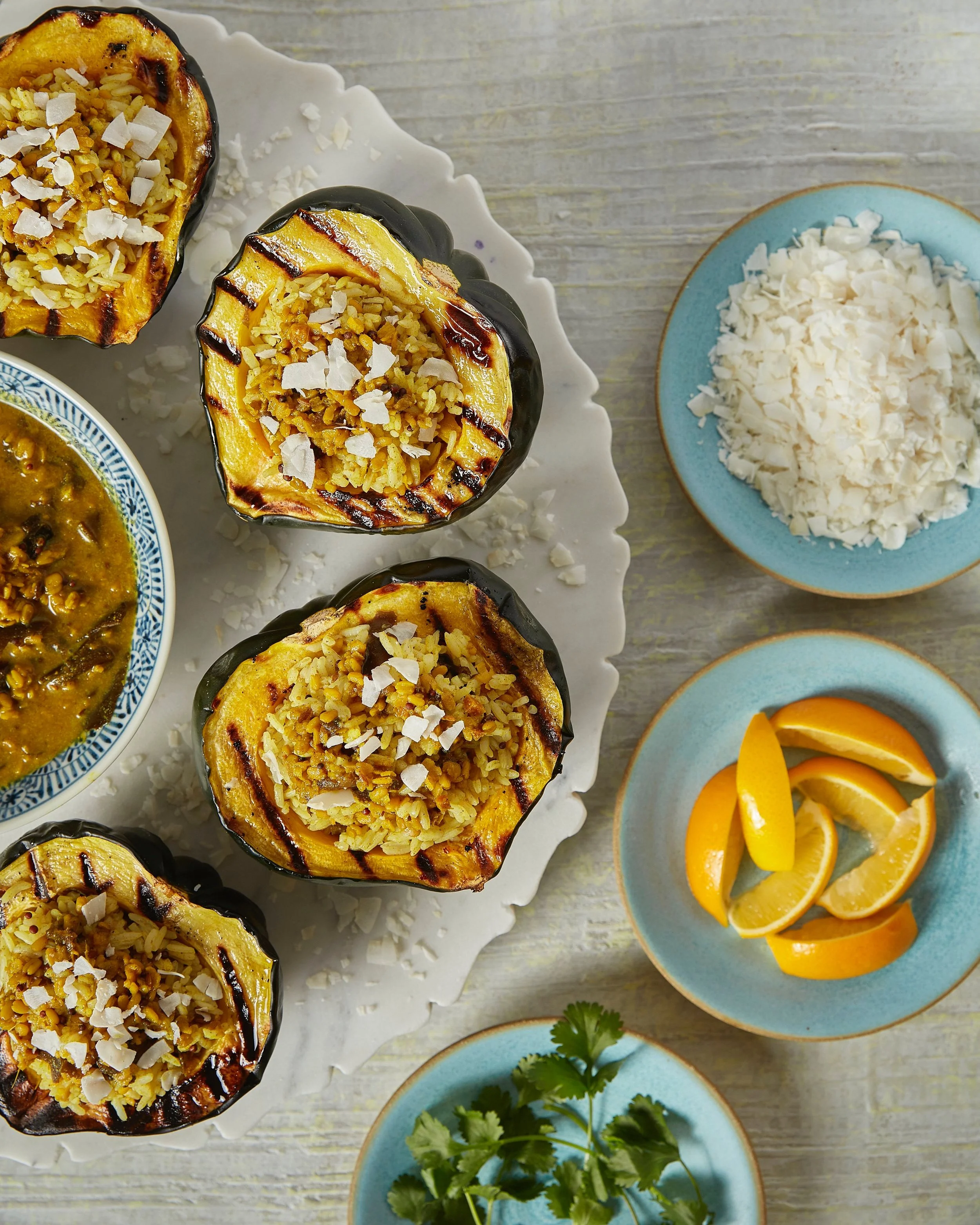A Vegetarian Sunday Supper with Asma’s Indian Kitchen
Welcome to another installment of Cookbook Club as we continue experimenting with Asma’s Indian Kitchen. We’ve already shared a rich and creamy chicken dish[1] with a sauce you’ll want to eat by the spoonful. Next, we experimented with mustard oil, and a delicate fish entree [2] in a tomato sauce. This next party is for our vegan friends.
Author Asma Khan includes suggested menus as a helpful resource in her cookbook, so you could consider supplementing these two recipes to make an even bigger veggie-loving feast.
Asma adapted the Spiced Whole Cauliflower dish from a traditional Mughlai meat recipe. She wanted a stunning dish for vegetarian guests. The recipe, as do many in the book, relies on lightly frying thinly cut onions for an added sweet flavor. This process is a bit time consuming and it will definitely fill your kitchen with the fried-onion aroma, but it’s worth every step.
The dal recipe yields a generous portion, but don’t try to reduce it, or the quantity of lentils will be too small to cook properly. Instead, Asma suggests the dal recipe can be “adapted to your own taste by adding extra ingredients to the lentils, such as handfuls of chopped spinach or chunks of fresh tomato,” so you can reinvent and reheat for dinner the next night.
Don’t forget to support local as you continue your cooking adventures with this book. Start by purchasing your copy of the cookbook from either of my favorite book sellers: Riverstone Books or White Whale Bookstore, then head to Kohli's Indian Imports, on Craig Street in Oakland, for the recipe’s more traditional ingredients.
Gobi Musallam (Spiced Whole Cauliflower (v))
Serves 4-6
Ingredients
1 Tablespoons whole milk
6 strands good quality saffron
⅓ cup (80 ml) ghee
1 medium cauliflower, trimmed
2 medium onions, thinly sliced into half moons
1 Tablespoons garlic paste
2 Tablespoons fresh ginger paste
2 cups (500 ml) plain whole milk yogurt
1 teaspoon garam masala
1 Tablespoon ground coriander
½ teaspoon cayenne pepper
1 ½ teaspoons salt (adjust to taste)
1 teaspoon sugar
Garnish
Almond and pistachio slivers
Directions
Gently warm the milk in a pan. Do not boil the milk. It should only be tepid; you do not want to scald the saffron. Touch the surface to check the temperature, then add the saffron strands and set aside to infuse.
In a pan or wok, heat the ghee over medium-high heat. Add the whole cauliflower and fry until brown on all sides. Remove the pan and place on a plate to drain, and set aside.
In the ghee leftover in the pan or wok, fry the onions until golden brown and caramelized. Transfer the onions to a plate to drain. Grind or mash into a paste.
Stir the onion, garlic, and ginger pastes into the yogurt, then add the ground garam masala, coriander, cayenne pepper, slat, sugar, and saffron-infused milk.
Place the whole cauliflower, base down, in a deep Dutch oven or cast iron pot. Pour the yogurt marinade over the cauliflower, then cover loosely with parchment paper and set aside for 20 minutes.
Place the Dutch oven over medium heat to cook the cauliflower, keeping it loosely covered with the parchment paper. Lift the paper and base the cauliflower regularly with the yogurt sauce to make sure it cooks evenly - depending on the size of the cauliflower, this should take 30 - 40 minutes. The cauliflower is cooked when a skewer goes in easily with only a slight resistance.
Do not overcook the cauliflower; bear in mind that the cauliflower will continue to cook a little after you take it off heat.
Before serving, taste to check the seasoning and adjust as necessary.
To serve, place the cauliflower whole on a serving plate or dish, then garnish with almond and pistachio slivers. Slice to serve.
Masoor Dal (Vegetarian with Vegan Option)
Serves 2 - 4
Ingredients
2 ½ cups ( 1 lb 2 oz / 500 g) masoor dal (red lentils)
2 Tablespoons ghee or oil for vegan option
3-4 dried chilis
1 small onion, finely chopped
4 garlic cloves, finely chopped
1 ½ teaspoons salt
1 teaspoon ground turmeric
For the Tempering:
2 Tablespoons ghee or oil
2 dried chilis
½ teaspoon cumin seeds
1 garlic clove, cut into slivers
4 fresh curry leaves (or substitute fresh lime zest)
Directions
Wash the lentils in cold running water, then place in a bowl and soak for 30 minutes in fresh cold water. (If you do not have time to soak the lentils, then just wash them before adding to the pan - red lentils cook quickly and do not need long soaking.)
In a heavy-based pan that has a solid lid, heat the ghee or oil over medium-high heat. Add the dried red chilis to the pan, followed by the chopped onion and garlic. Cook, stirring, until they just start to color.
Add the soaked lentils to the pan, then the salt and ground turmeric. Add 5 cups (1.2 liters) warm water to the lentils and bring to a boil. When the surface of the water is bubbling, cover the pan, lower the heat, and simmer gently for 30 minutes. Stir occasionally to ensure the dal is not sticking to the base of the pan. Once the dal is cooked, place it in a bowl and keep warm while you prepare the tempering.
For the tempering, heat the ghee or oil in a small frying pan over high heat. Working very quickly so the tempering does not burn, add the dried red chilis, cumin seeds, garlic slivers, and, finally, the curry leaves. Cook for a few seconds, then pour the tempering oil and spices over the warm dal in the pan. Next, take a spoonful of the dal and place it in the frying pan to absorb any remaining oil - take care while doing this since the oil may splutter - then tip the spoonful of dal from the frying pan back into the main dal pan.
Serve immediately, ladling the dal into separate serving bowls.
Story, Photography, Styling by Quelcy Kogel
Don’t miss a single delicious thing:
Subscribe to TABLE Magazine here!
12 Month - 6 issue subscription













Indulge in the taste spring with this delicious Cherry Galette